No Safety Net, No Internet: Jefferson's Laptop
The Declaration of Independence Was Written On a Portable Device of Jefferson’s Own Making
This is not crazy. Thomas Jefferson had a laptop. And I’m not crazy for including this topic in the category of No Safety Net, No Internet. I write the No Internet columns primarily about life away from the digital mills by focusing on outdoor excursions, diving into things on a whim while out and about and how family time builds a foundation and treasury of memories for the next generation. But when you consider that Jefferson invented things to suit his needs, helping him thrive in a world with no electricity, it’s time to take into consideration his accomplishments outside of the political theater and get to know him as a maker, a tinkerer, a musician, an accomplished agrarian, scientist, cryptographer - yes cryptography - and designer who loved swivels. He loved them so much he used them in very creative ways.
Living in the analog world, the 18th century analog world, has lessons for us. It’s not a limited existence. The steps you had to take to sharpen your mind and skills created a deeper grasp of subjects. And you develop stronger, more active mechanisms for interleaving areas of expertise given that you were responsible for building an understanding of your environment.
This is the antithesis of AI. It demonstrates a strength and a set of habits that I regrettably do not possess, yet I have more technology at hand to wield. Shouldn’t I be 10x the genius of the dudes from the late 18th century? In the end if I am not forming the habits that lead to creation, I won’t be fashioning things. I may be producing something with a click of the button, but I am not building something, I am just churning digital farts. The modern AI tools are encouraging a path to least resistance where the price is no personal ability. What happens when your tools fail you? Should I practice the crawl stroke with a pair of diving fins and life jacket, I’m really not building up my core swimming facility.
Many of Jefferson's cross functional mental training exercises are what produced a wide range of achievements. We can learn a lot from those practices, and perhaps improve our own. Ultimately it boils down to a platform offering us skills to rent out, versus starting our own quest to build ourselves and remain adept with many methods and, of course, our own sense of agency. We say when the writing is done when we author articles ourselves, instead of waiting for AI to tell us.
The Inventor and Innovator
To my mind, and perhaps because of my profound ignorance of Jefferson and the many of the Founding Fathers, I think of Jefferson as bookish in the sense that he merely wrote. Quill and parchment and candle at night only. That is patently false. Jefferson was obsessed with many disciplines, including astronomy, engineering, and music. While he did invent the wheel cipher for cryptography, he was forever improving on other innovations from other talented people.
This is his travel desk, a quasi portable drafting table he invented that accompanied him everywhere. As you can see the lid raised and folded out to provide a writing surface, and the side draw housed the inkwell. The long narrow compartment running the length of the draw housed the quills. Jefferson drafted the Declaration of Independence on this portable desk. Writing, note taking and assembling notes on all that Jefferson encountered during the day was of such great importance that he needed to do this from anywhere. All that was needed was a surface level enough to support the “laptop” and he could continue with his daily routines. Some of you may know I am a fan of the HBO series John Adams, and they have a facsimile of the writing desk in the scene where Franklin, Adams and Jefferson discuss edits to Jefferson’s Declaration. You can spy it on the table next to Adams at 00:10-12 mm:ss. Jefferson paces next to it as they mull changes to his text.
It’s worth noting that ingenuity was a must during the colonial period and early days of America. Under British rule, the colonies were prohibited from forging their own steel, as they could only purchase steel from the British. Mercantilism was essentially a form of globalism where the British East India Company and the Crown benefitted from moving raw materials out of the hands of natives to production centers in other regions, primarily in Britain.
To survive required many to be a jack of all trades. To thrive meant a relentless pursuit of obtaining skills with far less resources than what were available at the time across the ocean in Europe. While constrained socially, you had an easier time acquiring clocks, levers, gears springs because you were allowed at least to produce those in colonies. Parliament passed the Iron Act in 1749 which heavily restricted the production of finished steel and iron products. So if you needed steel for the cutting edge of your plough, you had to pay to import it, as well as a tax on that transaction. Steel furnaces, slitting mills and rolling mills were not allowed. These are some of the prohibited items:
knives, scythes, sickles
nails which were made from rod iron, from a slitting mill.
tinplate
Access to other resources such as libraries, universities, map collections, scientific societies and expertise of the world’s leading Enlightenment figures was also very limited. So you had to become your own expert. Jefferson was not a dabbler, but was immersed in many fields where he distinguished himself, including sciences. My ignorance is showing here, but Jefferson was president of the American Philosophical Society for 17 years which fostered scientific discovery and education. His love of mathematics and astronomy led him to find a manufacturer of a clock that would help him calculate solar eclipses. Jefferson also designed The Great Clock at his estate Monticello, a contraption run by a series of weights fashioned from cannonballs and suspended on each side of clocks. I understand the need for a central time piece to schedule activities, but how was predicting solar eclipses a priority? It amazes me that he had the inclination, let alone the time. I ask myself if I had only cannon balls, could I conceive of such a device, let alone make it work? No. Definitely not.
Jefferson had mechanical and mathematical facilities which he developed through a lifetime of study. This enabled him to create a manual cryptography cipher. It’s a brilliant use of dimension and simple mechanics that scrambles any message.
Jefferson had mechanical and mathematical facilities which he developed through a life of study. This enabled him to create a manual cryptography cipher. It’s a brilliant use of dimension and simple mechanics that scrambles any message.
The device consists of wheels, each wheel has the alphabet sorted randomly and differently per wheel. You select a row to use to form the phrase you wish to communicate. Next, pick a different row where the text will be scrambled, copy that garbled phrase and send that as your message. The recipient needs to have the same wheel with the same version of disks. The recipient simply spells out the scrambled phrase then looks at the other rows to find a message in English. What makes this even more cagey is that two consecutive letters of the same value will be translated as two distinct letters once they are scrambled. In other words, the “tt” from “attack” would not be translated to the same letter “jj”. They would be translated to something like “mx”, which further obfuscates any pattern leading to detection. Since no wheel would have the same sort order of the alpha, you would get two different letters. Each cylinder containing the alphabet in a different order would handle this challenge easily.
This spindle also has another advantage in that the order of wheels could be changed. So if your office was broken into by the British and they snatched up the cypher wheel, they could now decode messages easily. But that could be simply defeated by swapping the order of the wheels, and alerting others how to update their device and put their wheels on the spindle to match the new order on yours. It also meant if you dropped the spindle and the wheels fell off and you didn’t know the correct order, you were SCREWED. The spindle had 38 wheels, so it made 988 combinations of letters. Breaking that manually would take time. By our standards it would be easy to crack the combinations, but back then this was an ingenious method to keep communications secret.
This blows my mind when I consider the thinking required to come to that solution. It’s akin to tumblers on a bike lock, but it preceded the bike lock, that’s for sure. I am trying to picture how you would first visualize this solution. And once you see it in action, it’s simple and consistent but that’s why it’s just genius. For decades I’ve always thought that if you can understand the foundation of thinking that gave rise to something like this, you could also apply that thinking in other instances. Riffing on theme. And it’s an analog solution - it’s physical, you can pick it up and play with it, see the immediate results. But to conceptualize that device purely in your head - I marvel at that.
Jefferson’s Hand Held: Finding or Making Tools to Face Challenges
Jefferson collected data constantly, whether it be schedules for planting, work details, thoughts that occurred during the day or new discoveries based on conversations. While not the inventor of this method, Jefferson used what are called ivory polyptych to jot down notes when he was on the go. As you can imagine parchment, quill and ink were not practical if you were on horseback, or if you left your portable writing desk at the Continental Congress while you conferred with Franklin and Dickinson over ale at lunch. These cards were made of ivory, and you would write on them with pencil. They could be wiped clean after you recorded the item elsewhere at a later time. Since pen and paper were too scarce to be disposable, the ivory cards served as a durable hand held solution for recording thoughts during the day.
Jefferson used this method to gather ideas and then distill them further in what he called “commonplace memorandum” at the end of the day. This act of rewriting and reordering information into a larger context of related ideas enabled Jefferson to acquire great skill in science, engineering, history, music, linguistics, philosophy, botany and literature. He filled small books with these musings, and this process of writing allowed him to structure information for efficient retention, as well as bringing new associations of information to light as he added to his library of ideas.
It’s interesting to note that Jefferson was always on the lookout for ways of making improvements on what was at hand. There is an extensive set of letters between Jefferson and fellow musicians and instrument makers regarding ways to improve the designs for metronomes, pianos and violins. Jefferson’s letters are filled with exchanges on this topic, along with sketches to supplement the concepts being bantered about.
Music furnishes a delightful recreation for the hours of respite from the cares of the day, and lasts us through life.
In other letters, Jefferson would address the use of the Angle Saxon language, which he took upon himself to learn in order to have a better understanding of English common law. He was a proponent of reading works in their native tongue.
Today we just use Google or rely on someone’s translation.
It’s estimated that Jefferson wrote over 20,000 letters of correspondence. One year he relayed to John Adams that he received over 1700 letters, all which required his complete attention. He required that his grandchildren correspond with him, often sending them puzzles or riddles to solve that would test their grammar and thinking skills.
Writing, reassembling, categorizing and collating information was a daily practice for Jefferson. He picked up this habit while studying Latin, Greek, French, history, science, and classics with Reverend James Maury near Gordonsville, Virginia, his routine was 12 hours a day for study and 1-2 hours for exercise. All else was secondary. That discipline never let him down.
Tools for the Mind
If we are in the habit of shaping our environment, we truly shape ourselves as we gather what we need, including ideas, to make that vision happen. Be they physical objects or concepts, it doesn’t matter when the mind is active and makes sense of the new picture that emerges from interacting with our environs and our books. Sometimes it may require time to gather more information as we lead the experiment along.
As I said earlier, my perception of Jefferson and the Founding Fathers is shaped by the image of the tricorn hat, quills, and harpsichords playing in the background, and perhaps Mel Gibson wearing a ponytail when I occasionally conjure a colonial warrior. Their ideas were usually expressed in large blocks of text. In other words, they couldn’t exhibit modern thinking because there is a limited amount of information that could be gathered and absorbed - my perception comes from a world where I have cull from gobs of text that’s always at hand. But I’m used to data tables to be used for comparisons, because I’m advanced while they rode around on horseback and only had lanterns to light the night.
So due to my dumb preconceptions, I was shocked when I read Jefferson’s documents and letters regarding the management of his plantation. It’s tables and ledgers. Jefferson also conducted surveys regarding the sizes and weights of common wildlife of both Europe and the New World, and contrasted those in tables. Again my surprise comes from my dumb ideas of when “modern” analysis became commonplace, as clearly a guy with a quill and only a candle at night wouldn’t think to compare species of animals by their weight and present his findings in a chart. Yet when you read Jefferson’s notes and studies, they look like financial analysis reports. In handwritten form. Perhaps I’m obsessing over appearances, and writing this now I think of how I would just fire up Excel or Google sheets to produce those. I don’t know if I ever did that by flipping a piece of paper sideways, grabbing a ruler, deciding on the columns, and oops, I need another column, ok, now we’re good to go. What does that do for you mind when you have to measure, measure, measure and cut once like that, particularly when your notes are written on pencil on slabs of ivory because paper is too expensive and too scarce to waste with excessive revisions?
Let’s take this one step further. What if you are in the middle of this exercise of categorization, you have two parchment pages of charts that you labored over, and you want to get an update to Ben Franklin who is going to import scientific reference books from France based on your work? Do you copy it again by hand and add descriptions so that the horseback courier can whisk it up to Phillie? While Jefferson did invent a polygraph, as depicted below, how would you go about recreating tables with that device?
I would think correspondence would be more complicated because depiction of ideas would be so difficult to reproduce. Still, Jefferson - and I am sure others, too - were beyond one dimensional thinking, as some of his notes look like proto spreadsheets to me.

Another thing that struck me as a modern construct was Jefferson’s organization of his library. Which was huge. During his lifetime he collected between 9000 to 10000 books, and gifted a 6500 volume collection to the Congress.
With an appetite for integrating various disciplines and the need to retrieve information, the challenge is locating what you need, because no person can retain indexes from over 6500 books in their head. In modern tools there is a Mind Map, a diagram of subjects and their related elements, and with this tool relationships between what may appear to be different subjects is revealed. For example Google Notebook LM has such a tool, with output similar to this.
Jefferson also used this technique to organize his library on paper. It was a visual index to how the materials in his library were organized to support the projects and initiatives he had in mind. I was intrigued when I saw this snippet from a video of his library. Pardon the screen shot, I couldn’t find an image of this via Googling.
So to remain so engaged in so many different areas to such a depth the challenge is organizing your world and thoughts with paper only. Or less. I worked with a senior sales executive who could recall tenant information, location and current sales figures out of thin air. An amazing mind for recall, but was terrible with computers. But he was a master communicator as he somehow visualized and recalled information based on the layouts of properties he kept in his head. He wasn’t a Jefferson. But still, he had a system worked out where he could keep things ordered in his mind for his immediate use.
Jefferson, with his ivory index cards, habit of rewriting notes at night, created an amazing system for reinforcing his goals by organizing information as it came to him. An engine of learning. I used to call this an ActiveEngine, a way to inspire, learn and grow. Jefferson wrote of his routines:
I was in the habit of abridging and commonplacing what I read, meriting it, and sometimes mixing my own reflections on the subject.
Commonplacing was Jefferson’s process of assembling snippets of information in a format that made sense to him. Many benefits were reaped here as he could order this information for later recall, “spin” it into a different context, or perhaps innovate on other’s ideas. He even did this with the New Testament, stripping away all that he thought was superfluous to the teachings of morality in its passages.
A Doer or AI As A Doer Blocker?
What is amazing is that with all the writing that Jefferson did, he was a hands-on guy, as he built things, designed things, and augmented as he needed. The swivel chair that Franklin marveled at in the John Adams video is just one example, but a good one since Jefferson riffed on that theme and created his own rotation book stand that displayed 5 books at once, like a dual monitor situation many of us have at work or in our home office.
He then employed the concept of a swivel yet again on a shelf so that food could be delivered easily to his dining room. It’s a rotating door with a shelf. He also installed dumbwaiters into the sides of the fireplace so wine could be brought up easily to his guests during parties. Efficiency was a fixation for Jefferson. Some credit Jefferson with the invention of the lazy Susan, but whether he invented the lazy Susan or just incorporated the concept into multiple facets of Monticello, it’s clear that his energetic mind was eager to solve problems.
That’s the effect of living in an analog world. It forces you to solve problems. When I compare all the availability to information that I have today and how meager my output is compared to the writing of the Founding Fathers, I question the progress we have made. Habit and discipline are the keys to overcoming the lack of tools, because if you are committed to achieving your goals, necessity dictates that you make your own tools to achieve your goals.
I freely admit that I suffer from distraction. Too many rabbit holes entice me, and the hours just evaporate. In the end it’s up to me to turn the crap off. AI promises to deliver me more free time, but if I am not actively re-assembling what I learn into working models of information, it’s really just entertainment that leads nowhere. I see the strength in AI as being able to deliver in scenarios where you are under the gun and nothing will be gained by you segmenting information from bullet points and reassembling into a chart that compares categories, particularly if you’ve already done so in your head. In that case AI is just a much better macro or scripting language.
Part of my instinct forged from these modern days of tech tells me that you only gain so much skill from laying out documentation and that priority dictates other things must be done, so take the win with the shortcuts. But when I look at the effort expended and the volume of what Jefferson produced in his daily life, I suspect that a byproduct was an extreme sense of conservation of time and strong ability to maintain priorities. And mental exercise.
My mind is flabby. I can tell because of failure to recall names, stumbling when forming thoughts on the fly during discussion, and associations that I’ve made when younger that now take longer to build. Spending my time ingesting what others discover on the social media feeds takes me off the field in the battle to keep my mind sharp. With everything at your fingertips, can you say that you know where the trail to your expertise starts, that you understand the borders of your active understanding and knowledge.
We allow others to be sophisticated for us while we sit as a spectator and use their products. Google Maps is a great example. This passage is from the great book Why We Drive by Matthew B Crawford, where he describes what is happening to our thinking when we let Google do our navigation and thinking:
To make every place available to all is not to erase privilege if by that term we mean something illegitimate. Rather it is to erase an earned ability to know and to use diverse and localized pockets of the world according to different levels of personal investment and responsibility. Another way to name this would be the denial of ownership, conceived not simply as private property, but as title to inhabit some place on the earth as one’s own. We do so with others who are also in this place, rather than another place; let us call that collective ownership citizenship. Such essential or experiential ownership is to be sacrificed, not for the sake of a social idea, but for the sake of perfect legibility from afar, mediated by a single corporation.
Such an end point, if it were to be reached, would dispossess us not only of a home, but of that elusive thing that we seek in a road trip or backpack trip: moments of discovery that cannot be anticipated, purchased, or gotten cheaply through a screen.
On a sales trip to Chicago, my colleague and I grabbed a cab and at stop light we spied a car sitting in the far lane, immobile while the light was green. Our driver snorted and said “Uber”. I asked how he knew, and his answer was “because they have their face on in a phone. I have to know the city without the of a map, by heart, otherwise I wouldn’t be licensed to drive you two. They don’t know where they are going.”
The analog world is really our sparring partner, where we have to fight to make sense and order of things, but the ingenuity built from that struggle will never materialize if we don’t do the steps. And even if we invent a benevolent HAL 9000 who would never harm us intentionally, we have to do the steps.
We’re telling the next generations they won’t have tom but whose strategy does that really serve?





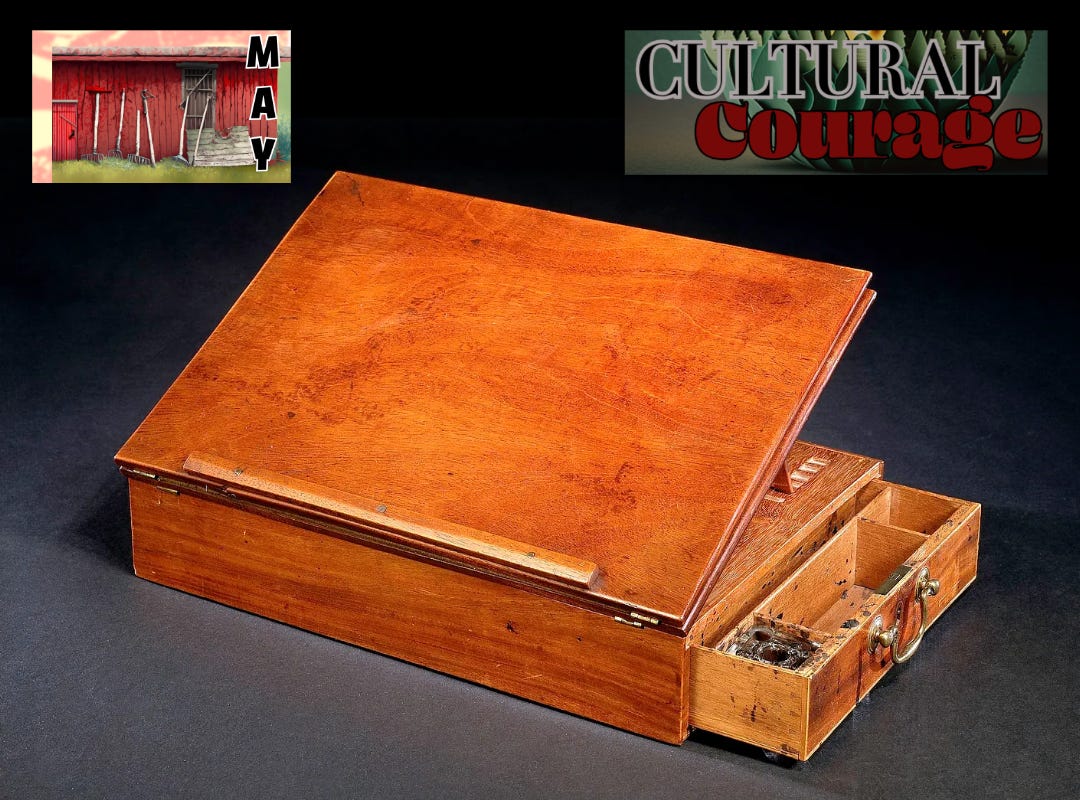
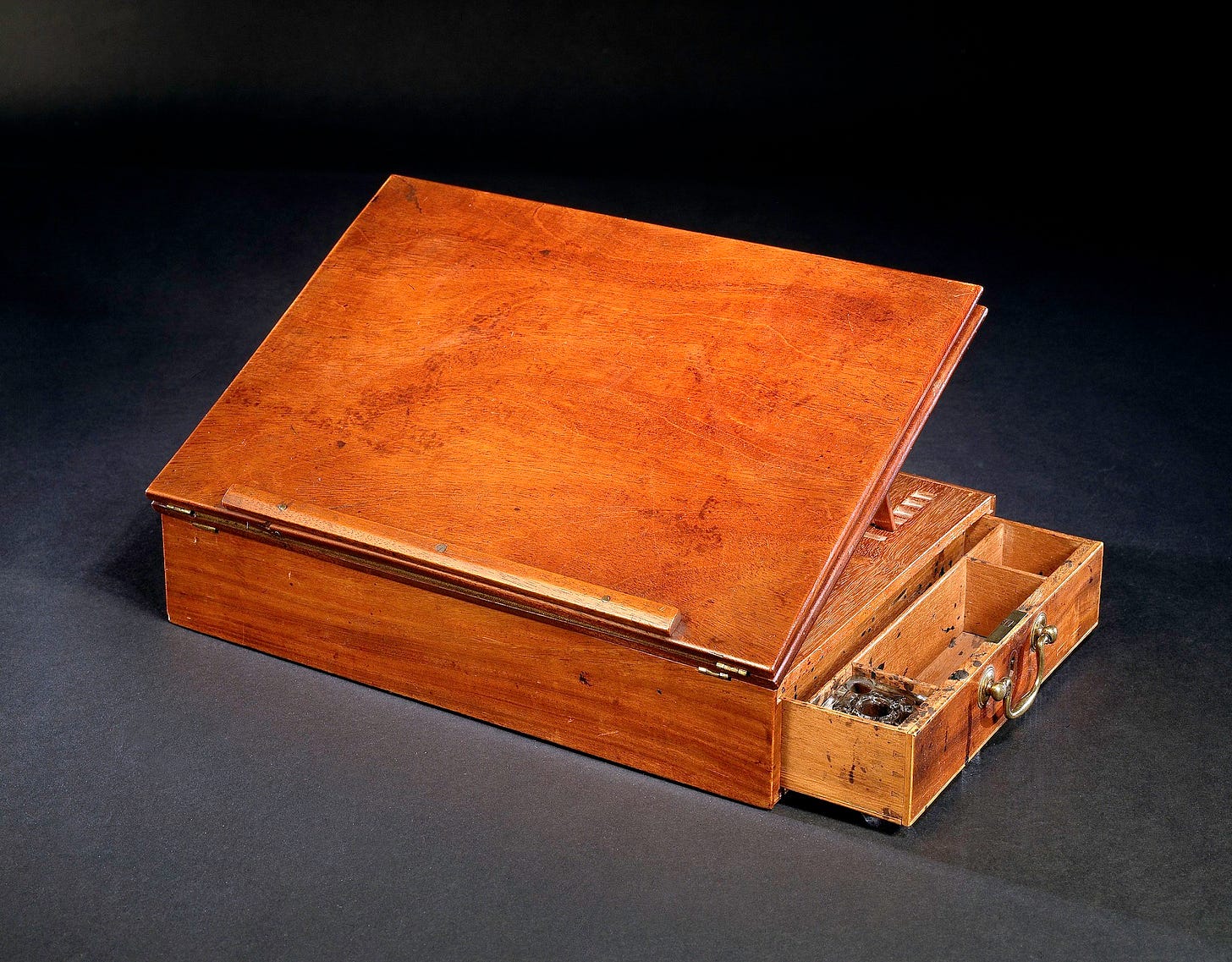
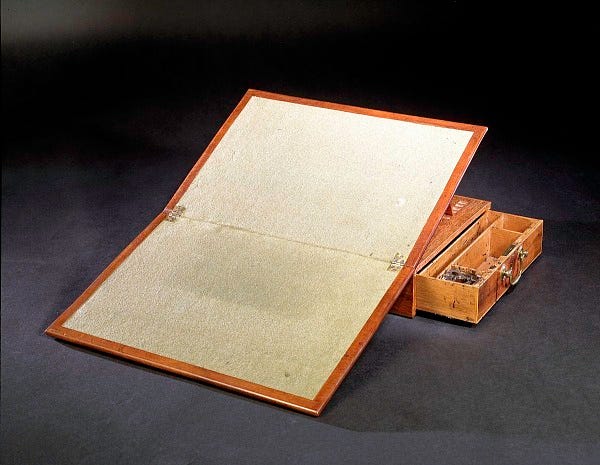
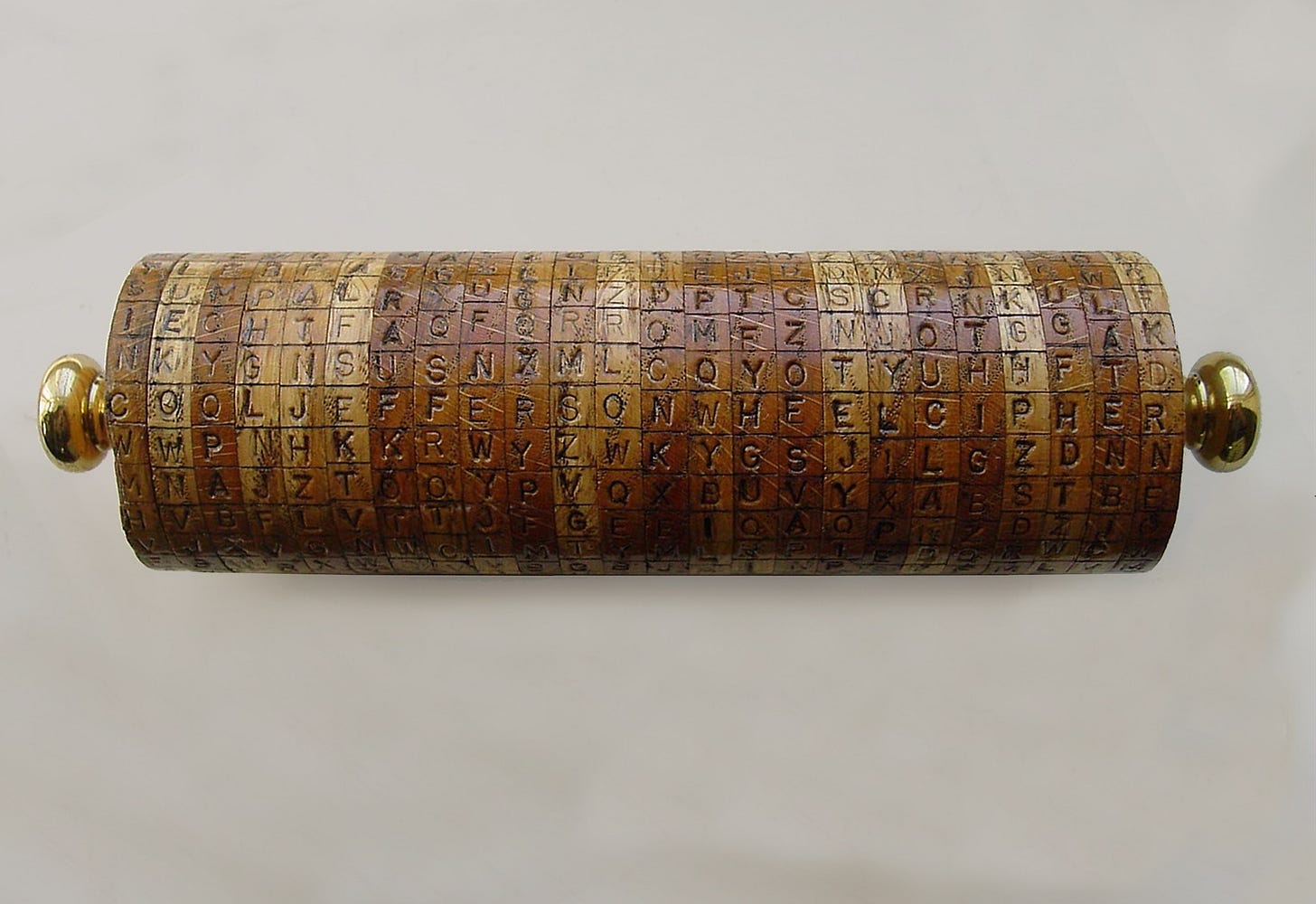
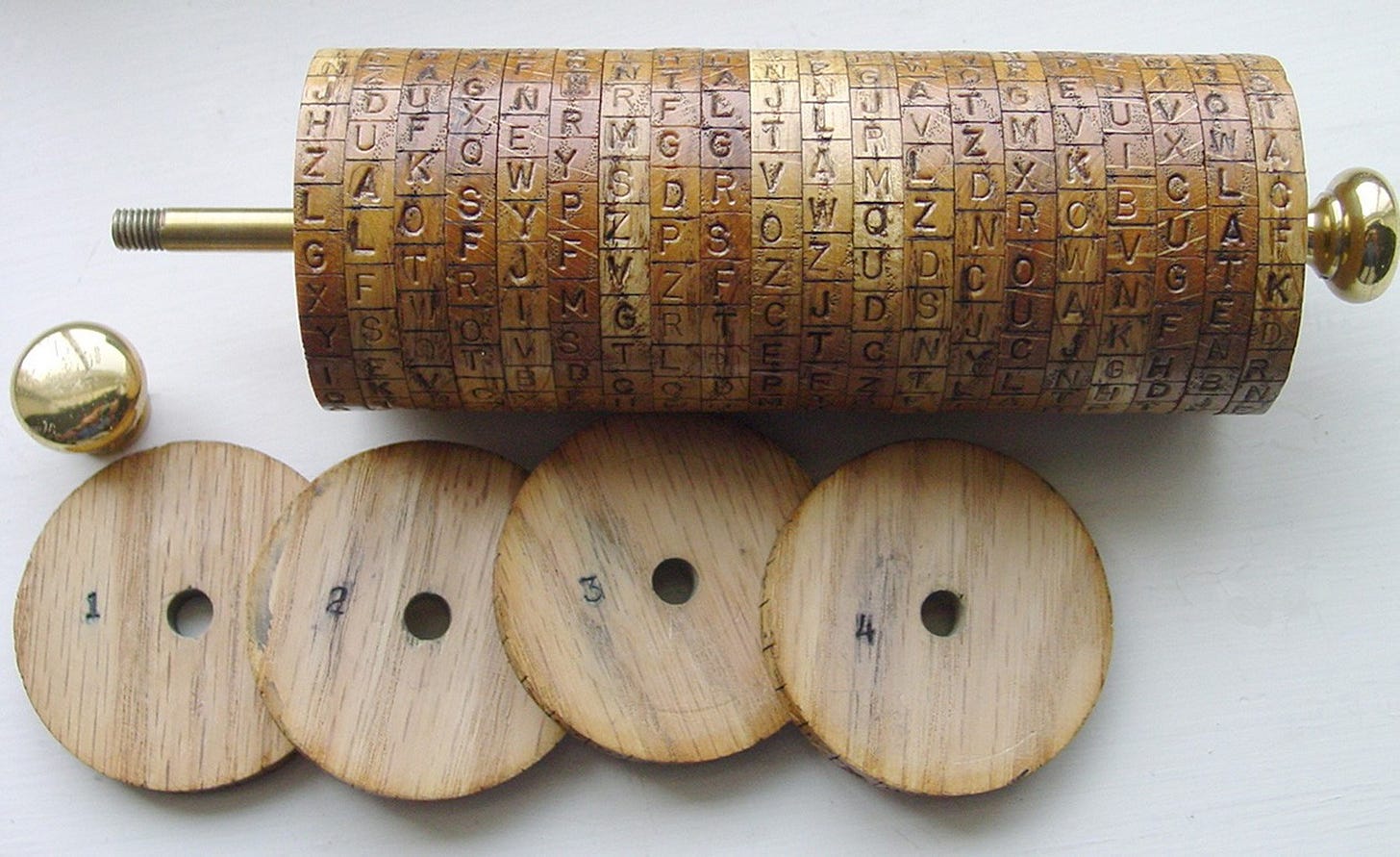
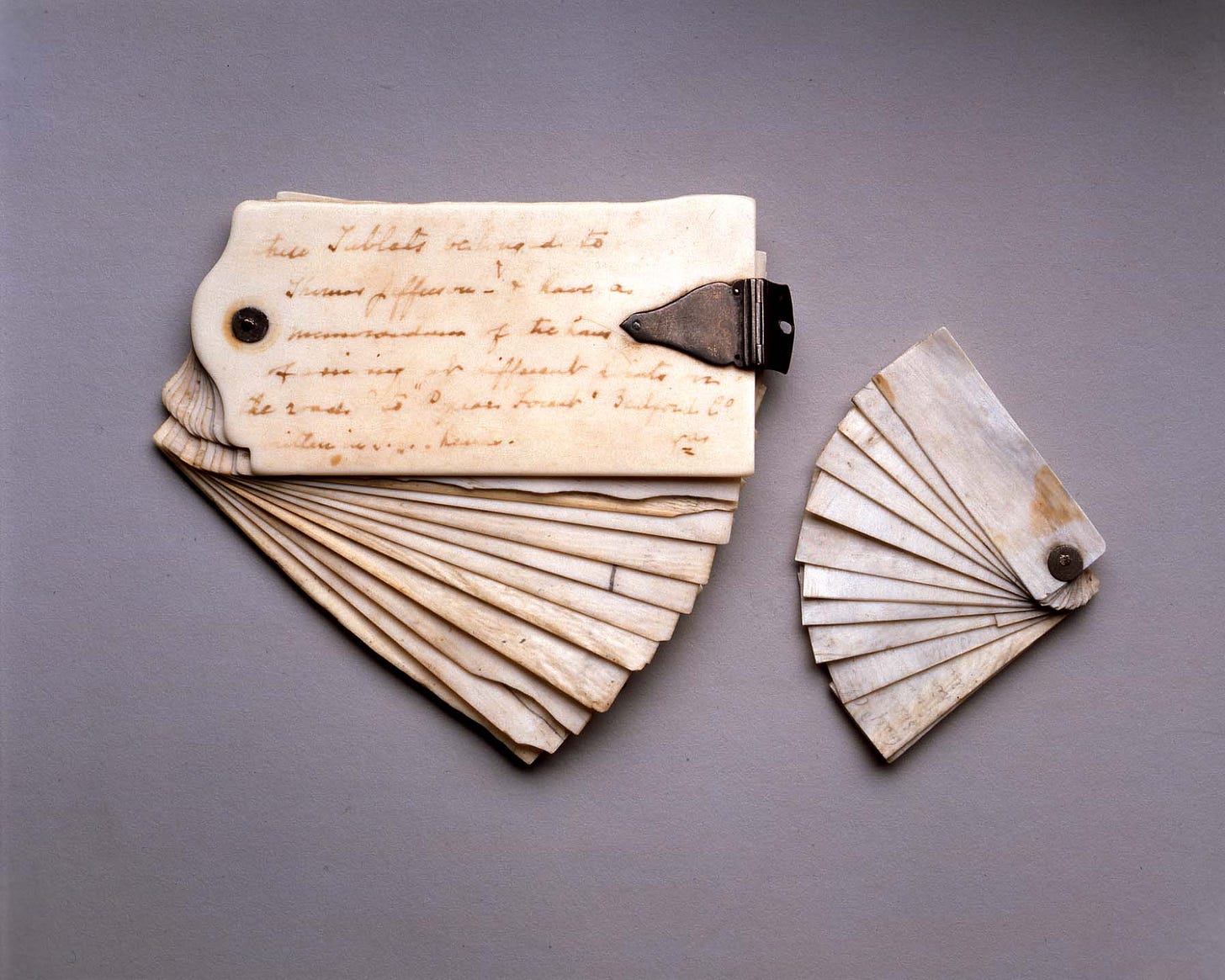
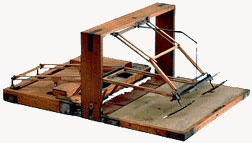
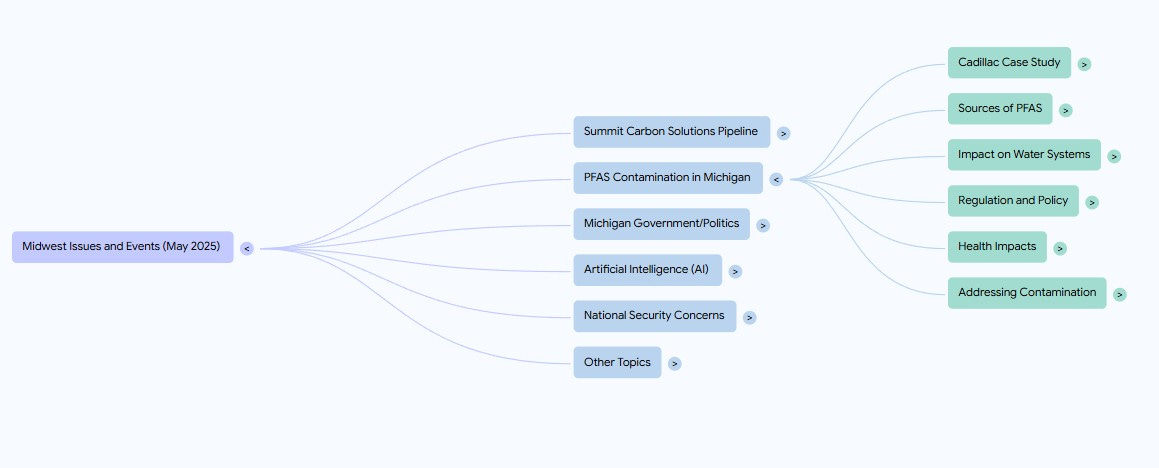
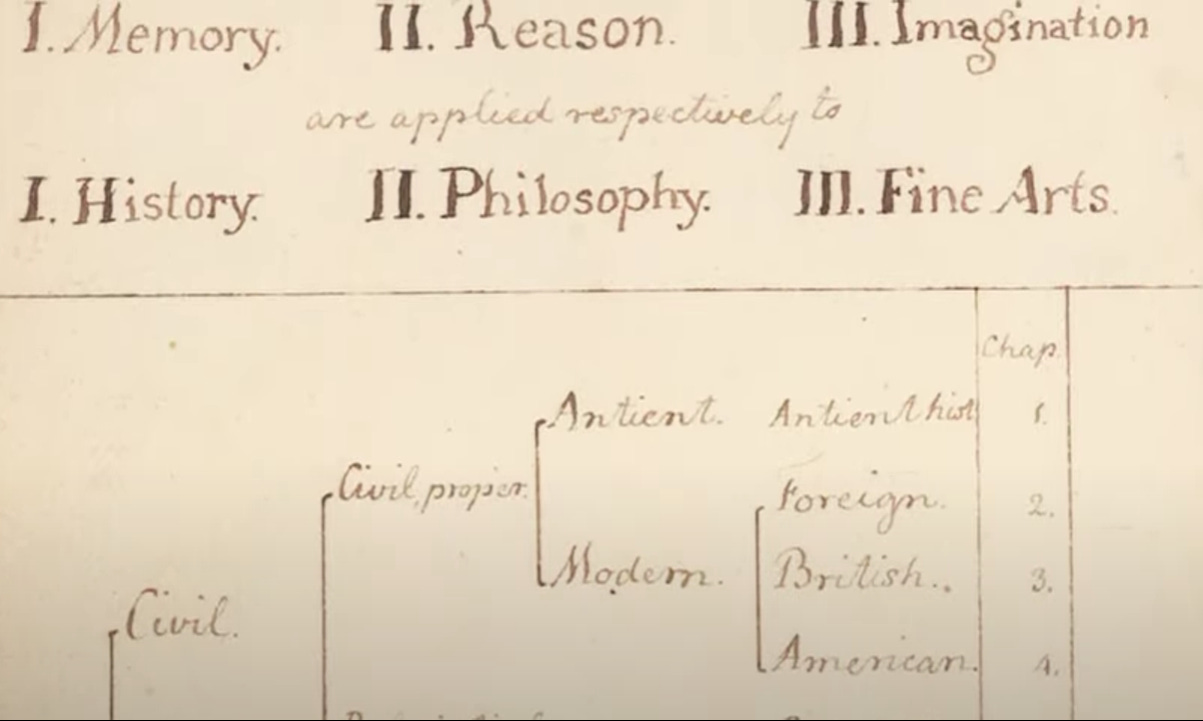
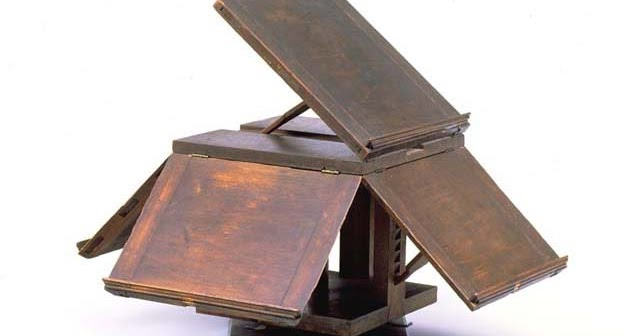

You did it again, you took something brilliant and wove it into a concept, a structure I would have never connected. That is some talented weaving. Yes I may have said Turing invented the computer but he was really the 20th century Jefferson with machinery. The Ivory reminds me of the ancient Phoenician communication techniques. You have elevated Jefferson from one of the least of the founding fathers historically, probably to due to the envy by whomever wrote it to being perhaps the true Genius; I do not think he was the egotist that others were. So many of these inventions Franklin seemed to get the credit for. I never would have put the multi table/box as a multi screen. This is critical. AI is here, if we do not draw the analogy of this article to our present and future, we will no longer be the innovative creative conceptually minded people that form governments. We must make laws, rules, prevent monopolies and control the AI before it controls us. Remember the Star Trek episode where the machine was looking for the sound of whales, if we lose our ability to free think, to know the history of earth 300 years before that episode, to go into the analogs and retrieve that, Voyager would have consumed USS 1701 …. Perhaps we need to make our archives now so AI does not get to choose them for us.
Dang, I'm so far behind in my reading! This looks so interesting, I just need time to read it all. I will as soon as I can, but my workload is heavy at the moment. I was scanning it and see that there is much to learn. Looks like you did a lot of heavy lifting on this one. Keeping it saved!